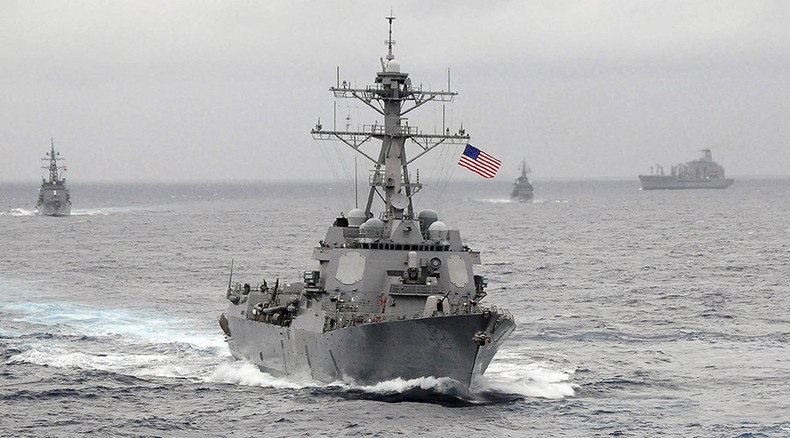'China no longer a Western colony & won't be bullied'

While the world’s attention has been focused on events in the Middle East and Ukraine and the US-Russia standoff, another crisis has been brewing in the South China Sea where Washington’s writ is being contested by China.
It is a territorial dispute that goes back centuries, but which has become increasingly tense in recent years.
Deepening tensions in the South China Sea involving a territorial dispute over the Paracel and Spratly Islands – in truth, submerged pieces of rock - are particularly delicate, given that the dispute involves multiple countries, including China, Vietnam, Singapore Malaysia, Taiwan, and the Philippines.
The waters around these islands are known to be rich in natural resources, and would constitute a significant boon to the economy of the state that has sovereignty over them.
Meanwhile, China - much to the consternation of the United States - has been actively constructing a man-made island in the area, which includes a runway big enough for military aircraft.
South China Sea tensions: US declares right to fly, sail anywhere intl law allows https://t.co/jV2B1LR7Fgpic.twitter.com/qf4fdJQBDJ
— RT (@RT_com) October 27, 2015This dispute cannot be treated in isolation from its wider geopolitical context. As China’s economy continues to grow relative to the US economy, Washington is using this dispute as an excuse to exert pressure on China militarily with the objective of intimidating Beijing and reminding it to know its place in the global scheme of things.
Consider the extent to which the US has been arming Japan, South Korea, and its other South Asian satellite states in recent years. The official line is that US allies located in proximity to China are upping their military spending in response to China’s own increase in military spending, which is set to rise by around 10 percent this year, pushing it just over $140 billion.
READ MORE: South China Sea tensions: US declares right to fly, sail anywhere intl law allows
However, China’s military budget still remains miniscule compared to the US equivalent, which the Obama administration has decided will come in at around a mammoth $585 billion in 2016.
Beijing claims that its increase in military spending is primarily to meet the cost of modernization, as it equips its army, air force, and navy with the latest technology and weaponry, and works to integrate them. It is also the case that as China’s economic footprint grows so does its security needs in order to protect those interests.
More importantly, we have to consider the deep national scars that remain ever present within the Chinese national psyche over the humiliation it has experienced in its history – not to mention brutality and barbarism – as a consequence of its occupation by Japan between 1931 and 1945, and prior to that as a colony of the Western powers.
Washington Plans to Send More Warships to South #China Sea https://t.co/SGREaEwp2H#mustread#feedly
— Alexei V. Kuznetsov (@Al_Kuz_RT) October 28, 2015All these factors play into the territorial disputes that are ongoing in both the South China Sea and East China Sea (in the latter case with Japan), and which show no sign of abating anytime soon. China’s determination to assert its territorial claim is a product of its determination to deter any would-be aggressor and ensure that its sovereignty remains inviolate.
Without any sense of irony, the US, operating on behalf of the other nations involved in the dispute, claims that China’s actions are a violation of international law and freedom of navigation.
This at least is the justification for the recent provocative appearance of the USS Lassen – a US Navy guided missile destroyer - patrolling waters claimed by China around the Spratly Islands.
READ MORE: China rebukes US 'microphone diplomacy,' suggests 'proper way' of handling differences
In response, the Chinese Ministry of Foreign Affairs summoned the US Ambassador to China, Max Baucus, for an explanation, railing against what it considers was a clear violation of its territory.
China also issued the following statement through its foreign affairs spokesman, Lu Kang: “If any country thinks that, through some gimmicks, they will be able to interfere with or even prevent China from engaging in reasonable, legitimate and legal activities in its own territories, I want to suggest those countries give up such fantasy."
He added that China “would resolutely respond to any country’s deliberately provocative actions.”
For too long Washington has viewed the world as a giant chessboard and nation states as mere pieces, available to be moved around according to US economic and strategic interests. When Chinese and Russian naval carrier groups are operating up and down US coastal waters on a regular basis, and when China controls the global economy via currency hegemony, then the more discerning among us may be willing to entertain criticisms of Beijing.
China launches global yuan payment system http://t.co/PBSrtLnm5Rpic.twitter.com/wVdBkbgt8k
— RT (@RT_com) October 11, 2015Until then we can only continue to expose the rampant hypocrisy and double standards that informs US engagement with other nations and regions. China is no longer a colony of the West and will not be bullied; this much is clear. Also clear is that the only path to peace and stability is a multipolar alternative to the unipolarity enjoyed by the US over the past three decades.
And let the midwife of this multipolar world not be chaos and conflict but diplomacy, compromise, and respect for the rights and interests of all states and nations. Let there be an end to a two-tier world made up of the US and its allies at the top, and the rest of the world below.
The alternative, after all, is just too awful to contemplate.
LISTEN MORE:
The statements, views and opinions expressed in this column are solely those of the author and do not necessarily represent those of RT.













